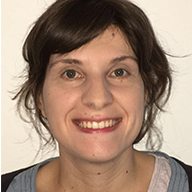06.09.2017
Pressemitteilung: Friedmund-Neumann-Preis für Ivana Nikić-Spiegel
Bildgebung von Neuronenschäden - Auf der Suche nach den molekularen Grundlagen der Multiplen Sklerose (Press release in English only)
Ernst Schering Foundation awards Friedmund Neumann Prize 2017 to junior scientist Ivana Nikić-Spiegel for her outstanding work on neuroinflammation
–– this press release is reproduced here with kind permission of the Ernst Schering Foundation ––
Ivana Nikić-Spiegel is group leader at the Werner Reichardt Centre for Integrative Neuroscience of the University of Tübingen. In her research, she combines two state-of-the-art technologies in a promising way. Already in her doctoral work at the University of Munich (LMU), the molecular biologist was able to describe a new form of neuronal damage (the so-called focal axonal degeneration), which is caused by immune cell attacks. But what happens at the molecular level during this neuronal damage? As a post-doc at the European Molecular Biology Laboratory (EMBL) in Heidelberg, Ivana Nikić-Spiegel developed a new method for protein labeling. Combining this with the use of super-resolution microscopy, she is now able to image the function of proteins at nanometer resolution and to use this technique for her investigations into neuroinflammation.
For her outstanding research Dr. Ivana Nikić-Spiegel is awarded with this year’s Friedmund Neumann Prize. The Ernst Schering Foundation awards the 10,000-euro prize to young scientists who have done outstanding basic research in human biology, organic chemistry or human medicine and who have already developed a distinctive scientific profile since completing their dissertation. The award aims to make visible excellent scientific achievement and help young scientists establish themselves in their field of research.
Dr. Nikić-Spiegel was nominated for the Friedmund Neumann Prize 2017 by Dr. Edward Lemke, group leader at the EMBL. “Ivana Nikić-Spiegel’s research helps us understand the pathology of multiple sclerosis, from the molecular all the way to the physiological and medically relevant levels. At the same time, she has the unique ability to develop and apply new and groundbreaking tools of chemical biology. This makes her research truly cutting-edge and internationally outstanding,” says Lemke.
Award Ceremony Friedmund Neumann Prize
September 25, 2017, 6:30 p.m.
Leibnizsaal at the Berlin-Brandenburg Academy of Sciences and Humanities
Markgrafenstr. 38 | 10117 Berlin
Registration is possible until September 17 at anmeldung@scheringstiftung.de
The award ceremony features a musical performance by the STEGREIF.orchester. It is the only improvised symphony orchestra worldwide, consisting of 24 young musicians who want to revolutionize classical music. Breaking away from strict conventions, they use neither sheet music nor a conductor. The resulting freedom facilitates spontaneity, improvisation, and movement. Each production is based on a classical symphony which is combined with different musical styles such as jazz, folk or techno. The STEGREIF.orchester thus creates a completely new sound experience, which is supported by an expressive choreography. www.stegreif-orchester.de
On the occasion of the award presentation, Dr. Ivana Nikić-Spiegel will present and discuss her research with students of the Lise Meitner School in Berlin on September 26.
Background information
Multiple sclerosis (MS) is a common neuroinflammatory disease, in which immune cells attack components of the central nervous system. These inflammatory attacks can happen at almost any region in the brain and spinal cord leading to a number of neurological symptoms, such as vision disturbances, numbness, tingling, mobility problems, fatigue and pain. Symptoms differ from patient to patient and MS has an unpredictable but often disabling course. It affects around 2.5 million people worldwide, of which more than 120,000 patients live in Germany. Current therapies cannot stop the progression of the disease. Consequently, it is important to understand the disease mechanisms.
During her PhD at the LMU, Ivana Nikić-Spiegel was trying to understand how immune cells damage axons – the long projections of neuronal cells. Axons are crucial for information transfer in the brain, and axonal injury is largely responsible for the irreversible neurological deficits that MS patients acquire. With transgenic mice and a special type of microscopy, she could directly look at the interaction of immune cells and axons. As a result of her PhD, Ivana Nikić-Spiegel and her colleagues described a new form of axonal injury. In a mouse model of multiple sclerosis, they could even reverse some of these damages. However, to translate their therapeutic approach from a mouse model into a real therapy of benefit for patients, scientists need to further understand what is happening at the molecular level. This is what Ivana Nikić-Spiegel’s group is currently doing. With a special type of light microscopy with nanometer ("super") resolution and new methods for protein labeling that Ivana Nikić-Spiegel developed during her postdoctoral work, Ivana Nikić-Spiegel and her team want to peer deeper inside the damaged axons. By combining these cutting-edge techniques, they hope to advance the molecular understanding of multiple sclerosis which might define new therapeutic targets.
Ivana Nikić-Spiegel studied molecular biology and physiology at the University of Belgrade in Serbia. Afterwards, she moved to Munich to join the laboratory of Martin Kerschensteiner at the University of Munich (LMU) where she did her PhD. Her PhD thesis was co-supervised by Thomas Misgeld from the Technical University of Munich (TUM). After her PhD, for which she won the “Dr. Hildegard und Heinrich Fuchs Preis zur Förderung medizinischen Nachwuchses” – the award for the best thesis in the Medical Faculty at the LMU – Ivana Nikić-Spiegel joined the Lemke group at the EMBL in Heidelberg. During her postdoctoral training she was supported by a Marie Curie IntraEuropean and an EMBO long-term fellowship. After her postdoc, she was appointed as a junior group leader at the Werner Reichardt Centre for Integrative Neuroscience in Tübingen. Last year Ivana Nikić-Spiegel got accepted in the Emmy Noether program of the DFG which will provide a 5-year support in research funds for her research group.
More information and images are available for download at www.scheringstiftung.de in the “press” section.
Organization:
- Werner Reichardt Centre for Integrative Neuroscience

